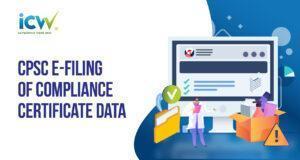CPSC Electronic Filing (eFiling) of Compliance Certificate Data
Consumer Product Safety Commission (CPSC) is developing a new Electronic Filing (eFiling) system to electronically file certain certificates of compliance data at the time of import. It has announced the Beta pilot test to pave the way for a permanent eFiling system.
In the future, the eFiling of compliance certificate data will likely become mandatory as part of the importing process, and importers may need to submit compliance before shipments.

Why is CPSC implementing eFiling?
The aim of implementing eFiling is to improve the safety of consumer products imported into the United States, by enhancing CPSC’s risk assessment, targeting, and enforcement ability to interdict non-compliant consumer products at the ports.
To advance the Commission’s consumer product safety mission, the Commission approved the staff’s recommended plan to implement a permanent eFiling program at CPSC on December 18, 2020
What is the CPSC Beta Pilot for eFiling?
Prior to the implementation of the permanent eFiling, CPSC is seeking 50 importers to participate in a six-month Beta Pilot stage of an eFiling initiative that will speed the detection of violative consumer products while facilitating the importation of compliant trade.
Similar to the Alpha Pilot conducted in 2016, the Beta Pilot requires participants to submit certain data elements from a certificate of compliance electronically (eFile) via a Partner Government Agency (PGA) Message Set to U.S. Customs and Border Protection (CBP).
The test in this stage is to inform rulemaking and help CPSC develop, test, and implement processes and procedures for eFiling certificates for imported, regulated consumer products. This initiative can benefit consumers and companies by allowing importers of regulated consumer products to file electronically with CPSC and U.S. Customs and Border Protection (CBP) certain data elements from a certificate of compliance.

What data are required for eFiling?
Participants will use the ACE system to provide the required consumer product information for electronic filing with CBP. According to the proposed PGA Message Set test, at least the following seven certificate data elements will be evaluated for regulated consumer products:
- Identification of the finished product (may use reference to GTIN (8) data for this element);
- Each consumer product safety rule to which the finished product has been certified;
- Date when the finished product was manufactured;
- Place where the finished product was manufactured, produced, or assembled, including the identity and address of the manufacturing party;
- Date when the finished product was most recently tested for compliance with the consumer product safety rule cited above;
- Parties on whose testing a certificate depends (meaning the name and contact information for the entity that conducted the testing); and
- A check box indicating that a required certificate currently exists for the finished product, as required by Sections 14 and 17 of the CPSA.
How to join the CPSC Beta Pilot Program?
CPSC will conduct a Beta Pilot test, scheduled to begin in fall 2023. For more information, please visit: https://cpsc-d8-media-prod.s3.amazonaws.com/s3fs-public/CPSC-eFiling-Beta-Pilot-Importer-Slick-Sheet-Final.pdf?VersionId=KVaKMtas6PCX33DiAMgXR.HWs.QJiqZZ

How will eFiling impact the trading industry in the future?
The CPSC requires domestic manufacturers or importers of children’s products to issue a Children’s Product Certificate (CPC) and non-children’s products to issue a General Certificate of Conformity (GCC). CPSC requests these certificates after a shipment has been identified or stopped for inspection at the port.
CPSC currently requests these certificates after a shipment has been identified or stopped for inspection at the port. Therefore, it cannot use certificate data in its risk assessment and targeting before shipment arrival.
When implemented, importers of regulated consumer products will electronically file certain certificate of compliance data elements with CPSC via the PGA Message Set at Entry, or at Entry Summary if both Entry and Entry Summary are filed together.
The eFiling program will help speed-compliant imported goods through the nation’s ports by replacing the current process of providing certificate information associated with shipments with electronic filing that can be used in risk assessment.
This means importers who use the eFiling system to provide accurate certificate information to CPSC will be less likely to have their shipments stopped at the ports for examination.
How can importers benefit from the eFiling process?
Risk scores will decrease for importers who electronically file valid data elements, resulting in fewer cargo examinations at the port. Electronically collecting certificate data at the time of import can enhance the identification of high-risk products, improve risk assessment, and facilitate legitimate trade.
The eFiling will enable CPSC to develop RAM algorithms to triage the enormous amount of import data received from CBP to detect non-compliant consumer products arriving at ports of entry more effectively. Using data and improved technology to detect non-compliant products is vital to focus CPSC’s limited resources on effectively protecting consumers from non-compliant and hazardous consumer products.
Will eFiling become mandatory for all importing goods in the future?
Future CPSC eFiling systems may extend beyond regulated consumer products, as the eFiliing process aims to improve the overall safety of consumer products imported into the United States.
